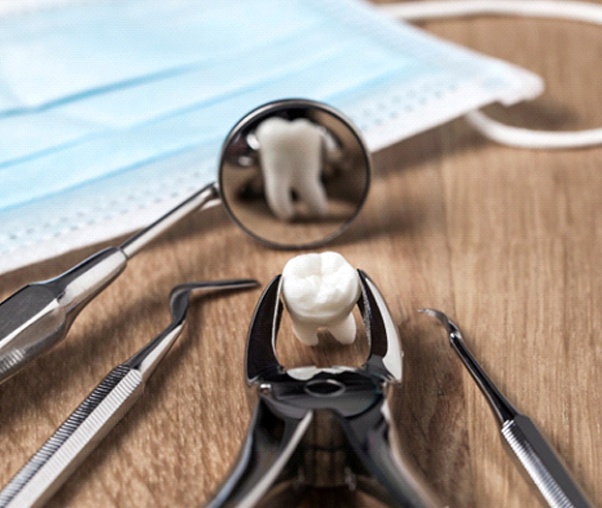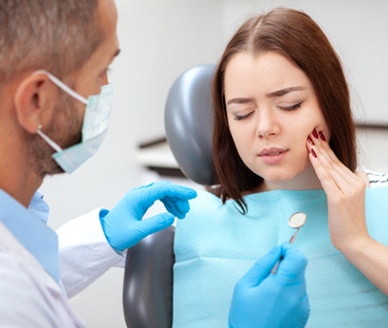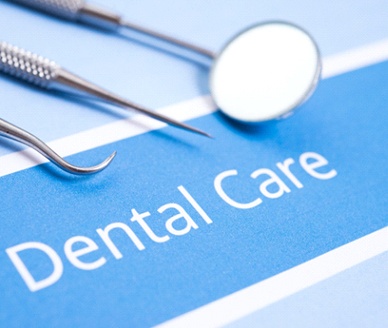Tooth Extractions – Carrollton, TX
Making Tooth
Removal Easy
We avoid removing teeth whenever possible, but there are times when it is the only choice. Dr. Suggala wants you to understand that you have nothing to be nervous about; your mouth will be numbed, and sedation will be administered when appropriate. You won’t have to worry about experiencing discomfort in the chair, and we’ll work to replace your tooth as soon as possible afterward. Call us today to take the first step if you think you may need one or more tooth extractions in Carrollton.
Why Choose Rosemeade Dental for Tooth Extractions?
- Dental Sedation Available
- In-House Implant Placement
- Friendly Bilingual Dental Team
Reasons Why Tooth Extractions Are Necessary

As your dentist in Carrollton, Dr. Suggala and our team want you to retain your natural teeth, so we only recommend extractions when absolutely necessary. Some circumstances that may call for tooth removal include:
- A tooth is so badly damaged it can no longer support a restoration.
- Tooth decay has reached the point where root canal therapy cannot salvage the tooth.
- Gum disease has destroyed the tissues holding the teeth in place.
- Orthodontic correction is needed but there’s not enough room for the teeth to make the necessary movements.
- Wisdom teeth have become impacted, meaning they can’t erupt properly in the mouth.
- A tooth is badly infected, and removing it is part of a plan to stop the infection from spreading throughout the body.
The Process of Removing a Tooth

To remove a fully erupted tooth, we use a special instrument called an elevator to loosen it and lift it before gently taking it out with forceps. In cases where the tooth is still underneath the gums, a surgical approach is needed to remove the tissue that is in the way; we might also need to remove the tooth in sections instead of all at once. In both cases, we’ll numb your mouth and perform the extraction as gently as possible.
Either before or shortly after your procedure, we may discuss your tooth replacement options with you. In most cases, replacing lost teeth is necessary to prevent future tooth loss and other oral health problems.
Tooth Extraction Aftercare

See below for image
Here are a few guidelines that can increase your comfort and reduce your risk of complications after your extraction:
- Take any medications as recommended, whether they are painkillers or antibiotics.
- After the first 24 hours, rinse your mouth with saltwater to manage inflammation and clean the extraction site.
- Avoid smoking and drinking through a straw.
- Keep your head propped up with pillows while you are sleeping.
- Listen to your body and get plenty of rest.
- Call us if you experience any severe or unusual side effects.
Additionally, you should be sure to attend any recommended follow-up appointments. We will check on your recovery and perhaps encourage you to get the ball rolling on tooth replacement. The sooner you fill in the gaps in your smile, the less likely it is that your other teeth will drift out of place or that your jawbone will experience significant deterioration.
Understanding the Cost of Tooth Extractions

The cost of tooth extraction in Carrollton is not the same for everyone. Because of the various factors that our team must consider, you can expect us to perform a thorough examination before compiling a clear estimate for your upcoming expenses. But don’t worry, as our trusted staff will help to navigate your dental insurance plan as well as maximize your benefits and discuss other available payment options.
Factors That Can Affect Tooth Extraction Cost

Only until our emergency dentist in Carrollton examines your teeth will we be able to provide a clear breakdown of your procedure and its expenses. Some of the most cost-associated factors we must consider include:
- The type of tooth that must be extracted and its location inside the mouth
- The number of teeth that must be removed
- The type of procedure you will require (simple or surgical)
- The necessary restoration you’ll need after extraction is complete (i.e., dental bridge, dental implant, partial or full denture)
Does Dental Insurance Cover Tooth Extractions?

When reviewing your policy, you will find that most dental insurance companies do provide partial coverage for tooth extractions. In most cases, up to 50% can be covered by your insurance carrier; however, this is dependent on whether you’ve met your deductible or have enough of your annual maximum still in existence.
No matter how your insurance company chooses to handle your tooth extraction, you can count on our team to not only review your plan but also provide assistance when it comes to maximizing your benefits and getting the most out of your policy before the end of the year.
Other Options for Making Tooth Extractions Affordable

If you are uninsured or need assistance to pay the remainder of your bill, it is possible for you to enroll in a low or no-interest payment plan through CareCredit. As a third-party financer, they are pleased to help patients struggling to pay for necessary dental care.
Offering exceptional payment plans, you can choose which one works best with your budget and timeframe.
Not when Dr. Suggala does it! Thanks to modern methods that include local anesthetic, dental sedation, and gently rocking the tooth (not pulling it), most patients don’t report feeling discomfort during the procedure. Our team understands that it can make someone feel nervous, so we’re always happy to answer questions and will take things slow on the day of the treatment so that remaining calm and cool is easy.
Yes, it is always best to replace an extracted tooth as soon as possible. This will not only restore the appearance of your smile, but also its function, enabling you to chew and speak like normal. Plus, filling the gap will prevent the neighboring teeth from shifting. Dr. Suggala offers multiple prosthetics that can be designed just for you, and he’ll help you choose the right replacement before your tooth is removed to expedite the process.
It largely depends on the nature of your job. If you mostly sit at a desk all day, then you can likely go straight back to work. However, if you have a more physical job, you may need to take a day or so off. This will ensure that the treatment site is able to clot properly—moving around too much or excessive activity can interfere with this and potentially prolong recovery.
In most cases, yes! The vast majority of dental insurance plans offer partial coverage for tooth extractions, typically in the neighborhood of 50% of the price. We can confirm this detail with you before the procedure so you have a solid idea of what you’ll be expected to pay out of pocket. And, if you don’t have insurance, we can discuss breaking up the cost into smaller payments using CareCredit.
Thanks to modern tools and practices, tooth extractions are quite safe. That said, even they carry some minor risks.
For starters, an extraction can lead to an infection. Bacteria may enter your body after the tooth is pulled and infect the treatment site. Later, the infection could spread through your body if it isn’t handled quickly.
You should also watch out for a dry socket. With this condition, the blood clot that forms after your extraction is dislodged. The socket's bones and nerves are then exposed, causing pain and delaying your healing.
To prevent these outcomes, our dentists will provide you with good aftercare tips. They’ll also share infection signs to stay wary of.
After tooth extraction, it’s crucial that you heal from treatment. You should thus do the following:
- Get Plenty of Rest – By taking it easy, your body can recover well from the procedure. That means no strenuous activities in the first 24 hours after treatment.
- Keep Gauze in Place – Once the extraction is done, keep your gauze pad in place. Doing so helps prevent a dry socket.
- Eat Soft Foods – After your tooth’s removal, follow a soft food diet for a while. Items like yogurt, applesauce, , and smoothies won’t disturb the treatment site.
- Manage Symptoms – Use a cold compress to reduce swelling and ease pain. Similarly, take over-the-counter pain medicine as instructed.
After a tooth extraction, your mouth needs time to heal. Dentures can’t be placed during this recovery period. So, you’ll likely have to wait 6-8 weeks to get your restorations.
Once you’ve fully healed, our dentists will take you through the denture process. They’ll first take mouth impressions used to craft your prosthetic teeth. At that time, they’ll note the ideal size, shape, and shade of your new chompers. The dentists will next send the impressions to a dental lab, which will create your dentures. Lastly, you’ll try the prosthetics when they’re ready and learn how to care for them going forward.
No, actually – you can’t smoke right after a tooth extraction. Doing so would disrupt or even reverse your treatment results.
You see, tobacco products aren’t good for the treatment site. Using them would delay its healing at a critical point. As such, you shouldn’t smoke for at least five days post-extraction. It’d be even better if you quit smoking for two weeks or more.
If you struggle to quit tobacco products, talk to our dentists. They won’t judge your situation. Instead, they’ll take it into account and help you prepare for the smoke-free period.
